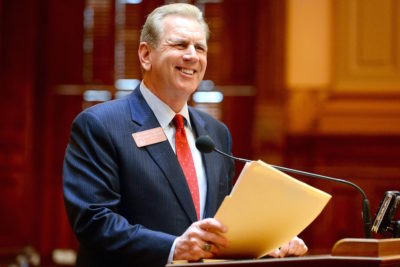
The House reconvened last week to begin our eighth week of the 2017 legislative session, and on Friday, March 3 we reached legislative day 28, also known as “Crossover Day.”
Each year, Crossover Day marks a crucial deadline for us as this is the last day for bills to pass the legislative chamber from which they originated to remain eligible for consideration for the session. We worked late into the night to pass meaningful and significant House bills to send to the Senate for their consideration. By 11:00 PM, we had passed 71 bills bringing the House total to 183 for the 2017 session.
In this column, I’d like to talk about three pieces of legislation that people in our area have shown a great deal of interest in. Two of these bills passed, and the third bill never came up for a vote, which has effectively killed it for this year.
Lawmakers expand medical cannabis law…
The first bill was HB 65 which passed out of the House overwhelmingly. HB65 would bring medical relief to many more suffering Georgians by expanding Georgia’s current medical cannabis law by adding eight qualifying medical conditions. These individuals would be allowed to possess cannabis oil with a maximum of 5 percent THC and a maximum amount of 20 fluid ounces, and would be required to register with the Georgia Department of Public Health after receiving a recommendation from their physician.
The Low THC Oil Patient Registry was created after the General Assembly’s passage of HB 1 during the 2015 legislative session, and there are currently over 1,300 patients registered, proving the success of the program and the treatment. By adding these eight medical conditions to the existing list, more hurting Georgians will be able to benefit from this treatment.
give State more control over failing schools…
The second bill that passed was HB 338. This bill seeks to improve Georgia’s struggling and lowest performing public schools by creating an alternative support and assistance system that falls under the State Board of Education.
Georgia currently has over 150 chronically failing school with nearly 90,000 children in them. It’s a problem that has to be addressed and one that’s not easy to solve. HB 338 helps the state intervene, but at the same time, allows for local control and input.
This legislation received bipartisan support and will greatly benefit our students attending underperforming public schools across the state. It also gives us the opportunity to examine and understand the root of the issues plaguing so many of our young learners, and I look forward to seeing the long-term positive effects of this legislation.
and kill casino bill
The most controversial topic we faced again this year was casino gambling. Overwhelmingly my district was opposed to this issue and I wholeheartedly agree with them. I understand the need to ensure the HOPE scholarship for our children’s future, however in my opinion this was not the way to do it. Studies have shown that in states with a lottery system in place, the addition of casinos can cause the revenue from lottery proceeds to fall which would have a negative impact on our HOPE scholarship funds. It’s a risk I’m not willing to take. I’m also concerned about gambling addiction and the impact it has on families. Obviously, my colleagues agreed with me, as we never even heard the bill in committee.
For now, this issue is dead.
There’s still a lot of work ahead as we start to look at Senate bills, but as always, you’re my first priority. I can be reached in Atlanta at 404-651-7737 or locally at 706-754-0706. If it’s easier, email me at [email protected]. Thank you for giving me the privilege of representing you. I’m honored and humbled by your trust.
About the author: Rep. Terry Rogers (R-Clarkesville) represents the 10th Georgia House District which includes portions of Habersham and White Counties. Rogers is Governor Nathan Deal’s Senior Floor Leader in the House of Representatives. He serves as Vice-Chairman of the Appropriations Subcommittee, Economic Development & Tourism Committee, and State Planning & Community Affairs Committee. Rogers also is a member of the Defense & Veterans Affairs, Human Relations & Aging, Regulated Industries, and Rules Committees.






